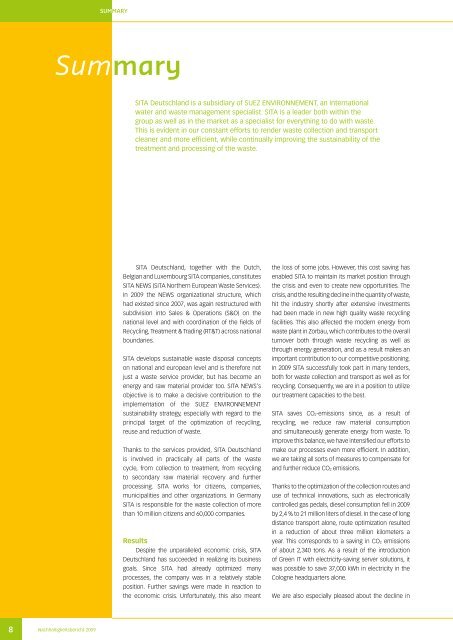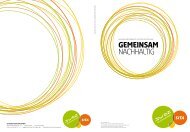nachhaltiges Handeln - Sita Deutschland GmbH
nachhaltiges Handeln - Sita Deutschland GmbH
nachhaltiges Handeln - Sita Deutschland GmbH
Sie wollen auch ein ePaper? Erhöhen Sie die Reichweite Ihrer Titel.
YUMPU macht aus Druck-PDFs automatisch weboptimierte ePaper, die Google liebt.
88<br />
Nachhaltigkeitsbericht 2009<br />
summAry<br />
Summary<br />
SITA <strong>Deutschland</strong> is a subsidiary of SUEZ ENVIRONNEMENT, an international<br />
water and waste management specialist. SITA is a leader both within the<br />
group as well as in the market as a specialist for everything to do with waste.<br />
This is evident in our constant efforts to render waste collection and transport<br />
cleaner and more efficient, while continually improving the sustainability of the<br />
treatment and processing of the waste.<br />
SITA <strong>Deutschland</strong>, together with the Dutch,<br />
Belgian and Luxembourg SITA companies, constitutes<br />
SITA NEWS (SITA Northern European Waste Services).<br />
In 2009 the NEWS organizational structure, which<br />
had existed since 2007, was again restructured with<br />
subdivision into Sales & Operations (S&O) on the<br />
national level and with coordination of the fields of<br />
Recycling, Treatment & Trading (RT&T) across national<br />
boundaries.<br />
SITA develops sustainable waste disposal concepts<br />
on national and european level and is therefore not<br />
just a waste service provider, but has become an<br />
energy and raw material provider too. SITA NEWS's<br />
objective is to make a decisive contribution to the<br />
implementation of the SUEZ ENVIRONNEMENT<br />
sustainability strategy, especially with regard to the<br />
principal target of the optimization of recycling,<br />
reuse and reduction of waste.<br />
Thanks to the services provided, SITA <strong>Deutschland</strong><br />
is involved in practically all parts of the waste<br />
cycle, from collection to treatment, from recycling<br />
to secondary raw material recovery and further<br />
processing. SITA works for citizens, companies,<br />
municipalities and other organizations. In Germany<br />
SITA is responsible for the waste collection of more<br />
than 10 million citizens and 60,000 companies.<br />
Results<br />
Despite the unparalleled economic crisis, SITA<br />
<strong>Deutschland</strong> has succeeded in realizing its business<br />
goals. Since SITA had already optimized many<br />
processes, the company was in a relatively stable<br />
position. Further savings were made in reaction to<br />
the economic crisis. Unfortunately, this also meant<br />
the loss of some jobs. However, this cost saving has<br />
enabled SITA to maintain its market position through<br />
the crisis and even to create new opportunities. The<br />
crisis, and the resulting decline in the quantity of waste,<br />
hit the industry shortly after extensive investments<br />
had been made in new high quality waste recycling<br />
facilities. This also affected the modern energy from<br />
waste plant in Zorbau, which contributes to the overall<br />
turnover both through waste recycling as well as<br />
through energy generation, and as a result makes an<br />
important contribution to our competitive positioning.<br />
In 2009 SITA successfully took part in many tenders,<br />
both for waste collection and transport as well as for<br />
recycling. Consequently, we are in a position to utilize<br />
our treatment capacities to the best.<br />
SITA saves CO2-emissions since, as a result of<br />
recycling, we reduce raw material consumption<br />
and simultaneously generate energy from waste. To<br />
improve this balance, we have intensified our efforts to<br />
make our processes even more efficient. In addition,<br />
we are taking all sorts of measures to compensate for<br />
and further reduce CO2 emissions.<br />
Thanks to the optimization of the collection routes and<br />
use of technical innovations, such as electronically<br />
controlled gas pedals, diesel consumption fell in 2009<br />
by 2,4 % to 21 million liters of diesel. In the case of long<br />
distance transport alone, route optimization resulted<br />
in a reduction of about three million kilometers a<br />
year. This corresponds to a saving in CO2 emissions<br />
of about 2,340 tons. As a result of the introduction<br />
of Green IT with electricity-saving server solutions, it<br />
was possible to save 37,000 kWh in electricity in the<br />
Cologne headquarters alone.<br />
We are also especially pleased about the decline in




